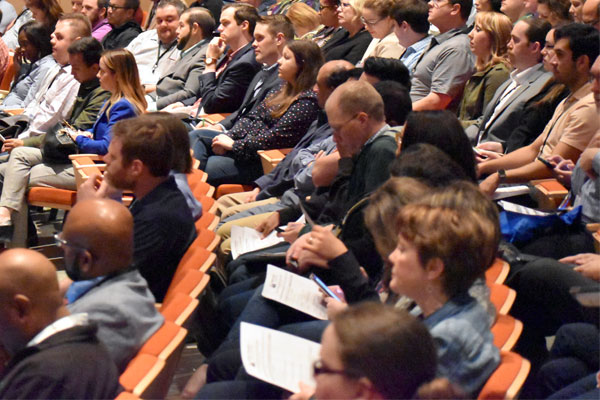
Top fraud professionals gather to share experiences, lead workshops and network.
The Fraud Summit, put on annually by the Jindal School’s Center for Internal Auditing Excellence, gathers professionals interested in the latest trends in fraud schemes and fraud prevention.
The two-day summit also offers continuing professional education through workshops and a general conference. The workshops offer 8 hours of CPE credit, and the conference offers another 8 hours of CPE credit.
Fraud Summit Explores World of Business Scams
Whether it’s an elaborate work-from-home offer, a monetary prize promised if you “act now” and send an advance fee to win, or countless other “opportunities,” anti-fraud experts have three words for you: Don’t do it.
Identity theft, investment scams, lottery schemes, mortgage fraud and hundreds of “can’t miss” offers are on the rise across the nation, demanding a higher degree of diligence and skepticism, experts told more than 400 investigators and auditors at the UT Dallas School of Management’s 6th annual Fraud Summit held March 24-25.

The sold-out Fraud Summit, sponsored by the school’s Center for Internal Excellence, has grown in reputation and is now one of the most well-recognized internal audit-related fraud conferences worldwide. Experts discussed such topics as the latest trends in white-collar crime, emerging fraud techniques, lessons from corporate criminals and “Why People Turn to the Dark Side.”
Swindlers bilked consumers out of an estimated $1.7 billion in 2010, U.S. Postal Inspector Tyrone Cox told the audience, citing statistics from the Federal Trade Commission, which also reports that most consumer complaints filed last year were fraud-related.
Although fraud crimes don’t involve violence, Cox said, they are just as serious because they prey on society’s most vulnerable – the economically disadvantaged, the unemployed and the elderly – who believe that an investment opportunity that arrives out of the blue could bring them fortunes.
“Don’t think you can’t be victimized,” Cox said. “People buy expensive cars, boats, watches – all off of other people’s money. They are wicked people.”
How do you spot a scammer? Cox says to look for: unrealistic returns, pressure to reinvest, no investment reports or a pitch from a person with an extremely flashy lifestyle. What can you do to protect yourself? Before making any commitment, Cox said, investigate credentials by contacting the Better Business Bureau, banks, investment reports and conducting site visits.
The same methods of deceit and violation of trust designed to defraud consumers are also at the heart of corporate fraud.
Former New York Times investigative reporter Kurt Eichenwald said when he was asked to cover corporate fraud, he didn’t believe the assignment would become a turning point for his career.

“I thought, ‘How much corporate fraud could there be?’ But 20 years later I’m still investigating corporate fraud because there’s a never-ending supply of it,” Eichenwald told the audience. “What’s so odd about it is that almost without fail, every single fraud case grows out of the same dirt.”
Eichenwald, best-selling author of The Informant, which was later made into a movie starring Matt Damon, has spent his career uncovering fraud and deciphering the staggering impact of corporate scandals on world markets, employees, customers, shareholders and public confidence. Audience members received a copy of Eichenwald’s most recent book, Conspiracy of Fools, which exposes the corporate deceit and betrayal in the Enron scandal.
The collapse of Enron was the “greatest corporate fraud of all time,” but it was incompetence and mismanagement at the top, rather than greed, that ultimately destroyed the company, Eichenwald said.
As a result of its deceptive accounting practices, including the creation of earnings, the manufacture of cash flow and the concealment of debt, Enron executives misled its board, investors and the public about its financial condition.
In 1996, things took an ugly turn when Scrushy realized the company would not meet Wall Street’s expectations and then demanded fraud to make up the difference, Beam said. But after misrepresenting the numbers for four quarters, Beam said he felt anguished and guilt-ridden.
Enron is a lesson in arrogance, recklessness and greed, Eichenwald said, and major corporations caught in accounting scandals following Enron have corporate cultures mimicking Enron’s: weak controls, unrealistic returns, closed-door policies and an arrogant management style.
“Columbia, HCA, WorldCom, HealthSouth and Enron – every one of them had a belief that they were geniuses, and it’s that arrogance that feeds into sloppiness,” he said.
Media Contact: The Office of Media Relations, UT Dallas, (972) 883-2155, newscenter@utdallas.edu.
